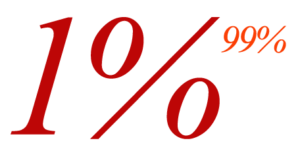 The recent global economic crisis lead to a controversial trend against the one-percenters and the fact that their properties constitute the majority of the world’s wealth. The popularity of this idea was not only limited to the occupied Wall Street campaigns, but it also grew so fast that even Barack Obama used this trend as one of his main policies in the late 2012 by ending the tax cut of wealthy Americans in order to get better support from the 99-percenters in his election campaigns.
The recent global economic crisis lead to a controversial trend against the one-percenters and the fact that their properties constitute the majority of the world’s wealth. The popularity of this idea was not only limited to the occupied Wall Street campaigns, but it also grew so fast that even Barack Obama used this trend as one of his main policies in the late 2012 by ending the tax cut of wealthy Americans in order to get better support from the 99-percenters in his election campaigns.
Besides working with some one-percenters during my career, I have also lived and worked in a society with even distribution of wealth and I totally felt the lack of one-percenters and the problems we face from their absence.
The even distribution of wealth in a society causes some problems that stops the society’s economic growth. Almost all scholars and experts agree that entrepreneurial practices are crucial for the economic growth. When the society holds a communist or socialist system with even distribution of wealth, there is less entrepreneurial activities than societies with capitalism structures.
First of all, the entrepreneur’s motives are one of the drivers of the entrepreneurial activities. Among the entrepreneur’s motives financial gain and personal achievement weigh more than other motives. Thus, the entrepreneurs who start their own business and tolerate much more trouble than others expect to get more back, as they work harder or make some innovative changes that should distinct them from others. In a society with social system, the entrepreneurs’ motives are simply retarded by paying too much tax. Mostly the tax system is a hurdle in such societies and there is less distinctions between such entrepreneurs and others.
The concept of the golden eagle entrepreneurs has already been discussed and their existence is of the essence for us. The habitual entrepreneurs who start multiple companies cannot have enough motivation after they see the even distribution of wealth in the country. One golden eagle entrepreneur can create more than thousands of jobs and dedicate his/her entrepreneurial skills to the society. However, when the earning of a founder of a company is the same as the earning of any other person in that society, the ambition is then deteriorated by the society system and law.
The golden eagle is opportunity oriented; it always calculates the energy gained from the prey as well as the energy that is spent for the hunting. When there is no gain in the hunting, the golden eagle does not venture into that hunting practice. Hence, in a society with less gain for the entrepreneurs, there will be less entrepreneurial practices, and consequently less jobs.
Furthermore, the one-percenters are also able to re-invest and this is really important to have people with investment capability in the society. People can re-invest what they gain and create more new jobs in the society fueling the entrepreneurial activities this way.
More than 11% of the jobs created in the United States are funded through venture capitalists who are all one percenters and many believe they do not have right to exist. They do not put their wealth under the pillow as a cash each night; but they invest their earnings into new projects and venture into new businesses. They mostly work harder than any other person in the society. One the one hand, they earn money and get richer and richer; on the other hand, they create more jobs, do philanthropist activities, and donate and help others more than anyone.
